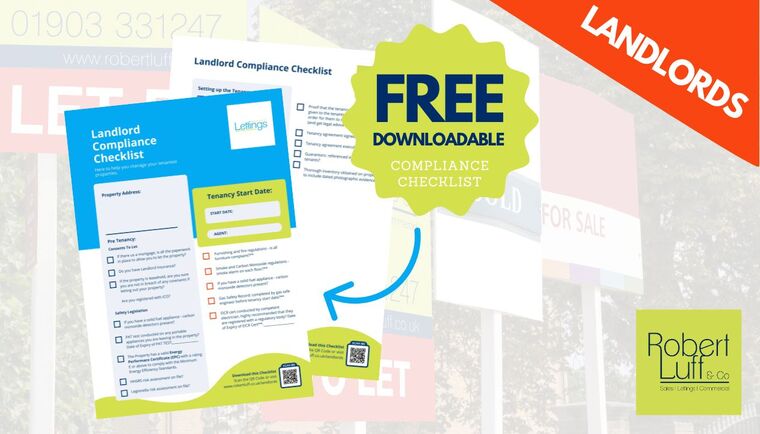Landlords: Are Your Rental Properties Compliant with Current Legislation?
5 Nov, 2024

Health and Safety Regulations
One of the most critical areas for landlords is health and safety. Ensuring that your property is safe and habitable is not just a legal requirement; it’s also your moral duty to your tenants.
Gas Safety
Every gas appliance in the home needs an annual gas safety certificate. This entails appointing a Gas Safe qualified engineer to do an inspection and produce a certificate for you to present to your renters before they move in. Ignoring this obligation could lead to large penalties up to £5,000 and maybe criminal charges, not to mention the implications of using unsafe gas appliances.
Electrical Safety
From July 2020, landlords are required to have, at least once every five years, the electrical installations of their rental homes checked and tested. Renters must have a copy of the Electrical Installation Condition Report (EICR). This process makes sure that your property meets the safety requirements and protects renters from electrical hazards.
Fire Safety
Every floor of your rental property legally requires you to install smoke alarms. Rooms with a solid fuel appliance, such as a wood-burning stove, or a gas appliance such as a fire, also need carbon monoxide alarms installed. These alarms should be routinely checked to be sure they are operating as they should, and batteries should be changed as needed. If you own a House in Multiple Occupation (HMO), you will be obliged to follow more stringent fire safety rules.
Energy Efficiency Standards
Another area landlords have to consider is the energy economy. The government is dedicated to raising the energy efficiency of houses throughout the United Kingdom; hence, landlords are expected to play their part.
Minimum Energy Efficiency Standards (MEES)
Renting a house with an Energy Performance Certificate (EPC) grade below E has been illegal since April 2018. This also applies to all current tenants from April 2020; so, landlords cannot keep letting buildings that fall short of these criteria unless they have a good reason for exception. Install better insulation, switch to energy-efficient boilers, replace windows and doors, and so improve the energy efficiency of your house. Ignoring MEES runs the risk of fines ranging from £5,000.
Tenancy Agreements and Deposit Protection
The foundation of a legally valid landlord-tenant relationship is a well-written tenancy agreement. It provides a reference point for disagreements and highlights the rights and obligations of both sides.
Written Tenancy Agreement
Every tenant should have a formal tenancy agreement that specifies the parameters of the tenancy, including rent rates, deposit details, length, and any unique clauses. Your tenancy agreement should reflect current law and provide all necessary legal points of reference.
Deposit Protection Scheme
If you take a deposit from your tenants, you are legally obliged to safeguard it within 30 days of receipt in a government-backed tenancy deposit program (TDP). England and Wales now have three recognised schemes: Tenancy Deposit Scheme (TDS), My Deposits, and Deposit Protection Service (DPS). Maintaining your tenant's deposit guarantees fair and legal handling of any disagreements over overdue rent or damage. Ignorance of protecting the deposit could lead to fines three times the deposit value.
Right to Rent Checks
The Immigration Act 2016 requires landlords to perform Right to Rent checks to ensure that their tenants are entitled to live in the UK. This means looking over records, including passports or visas, before allowing a tenant into your property. Ignoring these inspections might cost fines. Every change in the immigration status of the tenant demands continuous awareness and an update of your checks. Although it could seem like an additional administrative chore, it is really necessary to make sure your lettings are legal and compliant.
Licensing Requirements
Some rental houses call for a licence, especially if they qualify as HMOs. An HMO is defined as a property rented out by at least three non-related individuals sharing facilities like the kitchen and bathroom but not living together (the number can vary). Should your property be considered an HMO, your local government will require a licence. This process ensures that your house meets necessary standards of health and safety. Some authorities also demand that landlords obtain a selective licence, even for single-family homes, especially in areas where anti-social behaviour or insufficient housing standards generate problems. See your local council website to be sure the correct licences are in place.
Staying Informed and Up-to-Date
Changing property rules mean that landlords must be current with new and upcoming legal responsibilities. Keeping current with the most recent developments can allow you to ensure that your rental properties are legal compliant, protecting your tenants and your investment. To stay up to date, you should regularly visit government websites, sign up for landlord magazines, or maybe even join a landlord group. Associations like the National Residential Landlords Association (NRLA) offer tools, support, and information on how laws are changing. It will help you deal with the complicated world of renting out property.
Being a good landlord in the UK depends critically on your rental properties following current laws. From health and safety inspections to energy efficiency, licensing, and tenant rights, the laws guard both landlords and tenants equally. Although keeping compliant seems like a lot to handle, it not only keeps you on the right side of the law but also helps establish trust with your tenants, therefore improving relationships and a more profitable rental property.
Many landlords employ the services of a letting agent to take care of many, if not all of the numerous tasks that renting a property entails. We already work for hundreds of landlords who want an almost ‘hands-free’ solution where we take care of everything. Others are happy to be involved in some way. However you need help with a rental property, the friendly and experienced Robert Luff and Co team are standing by to assist you.
Want a copy of our FREE DOWNLOADABLE Landlords Compliance Checklist? Simply email our Lettings Team today lettings@robertluff.co.uk